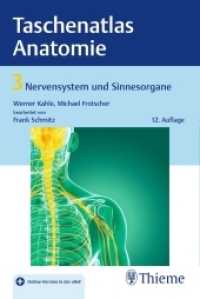- ホーム
- > 洋書
- > 英文書
- > Business / Economics
基本説明
Explores the way knowledge, data, and information relate to economic value, and the work of managers and entrepreneurs.
Full Description
With the rise of the knowledge economy, the knowledge content of goods and services is going up just as their material content is declining. Economic value is increasingly seen to reside in the former - that is, in intangible assets - rather than in the latter. Yet we keep wanting to turn knowledge back into something tangible, something with definite boundaries which can be measured, manipulated, appropriated, and traded. In short, we want to reify knowledge.
Scholars have been debating the nature of knowledge since the time of Plato. Many new insights have been gained from these debates, but little theoretical consensus has been achieved. Through six thematically linked chapters, the book articulates the theoretical approach to the production and distribution of knowledge that underpins Max Boisot's conceptual framework, the Information Space or I-Space. In this way the book looks to provide theoretical and practical underpinnings to Boisot's book Knowledge Assets (OUP, 1998).
Following an introductory chapter, how knowledge relates to data and information is first examined in chapter 1, and how different economic actors - entrepreneurs, managers, etc - use knowledge as a basis for action is explored in chapter 2. Chapter 3 looks at how the heterogeneity of economic actors arises naturally from their respective data processing strategies in spite of any similarities in the data that they might share. Chapter 4 argues, contra much transaction-based economics, that an organizational order must have preceded a market order, something that should be reflected in any knowledge-based theory of the firm. Chapter 5 discusses the cultural and institutional significance of different kinds of knowledge flows. Finally, chapter 6 presents an agent-based simulation model, SimISpace, that illustrates how the I-Space might be applied to concrete problems such those of intellectual property rights. A concluding chapter proposes a research agenda based on the theorizing developed in the book.
The approach the book sets out is used by a whole range of organizations to issues of knowledge management, policy, economics, and organizational and cultural change.
Contents
Introduction ; 1. Data, Information, and Knowledge: Have We Got It Right? ; 2. Crossing Epistemological Boundaries: Managerial and Entrepreneurial Approaches to Knowledge Management ; 3. Codification, Abstraction, and Firm Differences: A Cognitive Information-based Perspective ; 4. Organizational versus Market Knowledge: From Concrete Embodiment to Abstract Representation ; 5. Moving to the Edge of Chaos: Bureaucracy, IT, and the Challenge of Complexity ; 6. Property Rights and Information Flows: A Simulation Approach ; 7. Conclusion







